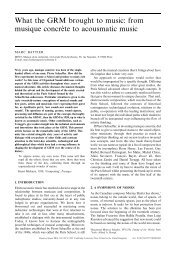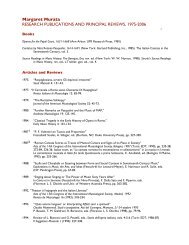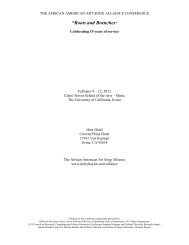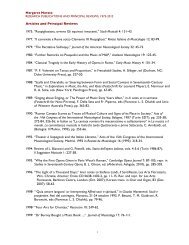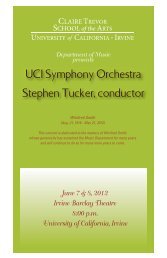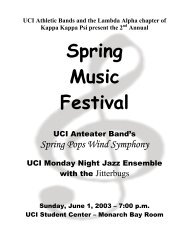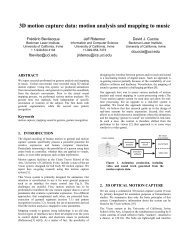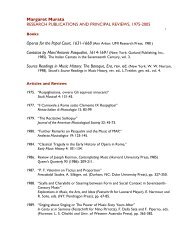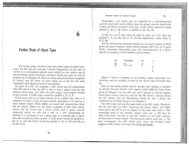amy bauer The Other of the Exotic: Balinese Music as Grammatical ...
amy bauer The Other of the Exotic: Balinese Music as Grammatical ...
amy bauer The Other of the Exotic: Balinese Music as Grammatical ...
You also want an ePaper? Increase the reach of your titles
YUMPU automatically turns print PDFs into web optimized ePapers that Google loves.
<strong>The</strong> <strong>O<strong>the</strong>r</strong> <strong>of</strong> <strong>the</strong> <strong>Exotic</strong> 339<br />
and Cage move directly to <strong>the</strong> underlying conceit: a more concise, if somewhat<br />
vague, evocation <strong>of</strong> <strong>the</strong> o<strong>the</strong>r. Paradoxically, <strong>the</strong> rise <strong>of</strong> Cage’s conceptual orientalism<br />
coincided with <strong>the</strong> incre<strong>as</strong>ing ubiquity <strong>of</strong> <strong>the</strong> non-Western and its<br />
consequent loss <strong>of</strong> identification with <strong>the</strong> strange, <strong>the</strong> mysterious and <strong>the</strong> sexually<br />
alluring. It is in precisely this sense that <strong>the</strong> non-Western o<strong>the</strong>r comes to<br />
serve a grander and more exalted function in contemporary art music. <strong>The</strong><br />
reverse <strong>of</strong> an exotic that once <strong>of</strong>fered only arabesque or disembodied notions <strong>of</strong><br />
purity or objectivity must be that which is nei<strong>the</strong>r superficial nor indefinite. <strong>The</strong><br />
o<strong>the</strong>r <strong>of</strong> <strong>the</strong> exotic is <strong>the</strong> solid, disciplined structure which Corbett lauds in <strong>the</strong><br />
minimalists Philip Gl<strong>as</strong>s and Steve Reich, who use <strong>the</strong> complexities <strong>of</strong> cyclic time<br />
to ‘undermine composerly practice’ (Corbett 2000, p. 174).<br />
Ligeti entertained a similarly noble yet somewhat more daunting <strong>as</strong>piration:<br />
that <strong>of</strong> transcending all reductive stylistic affinities in order to produce ‘an<br />
ideologically free style’ [ein ideologiefreier Stil] wherein vagaries <strong>of</strong> rhythmic<br />
construction, tuning and temperament fuse toge<strong>the</strong>r to realise a musical language<br />
unique to each work (Ligeti 1993, p. 29). An article in a special issue <strong>of</strong><br />
Neue musikalische Zeitung serves <strong>as</strong> a manifesto <strong>of</strong> his aes<strong>the</strong>tic position:<br />
Thirty, actually twenty years ago, more or less, I belonged to a composition group<br />
understood <strong>as</strong> ‘avant-gardist’, [but] I am no longer tied to any group ideology.<strong>The</strong><br />
avant-garde protest action w<strong>as</strong> <strong>the</strong> political gesture <strong>of</strong> an elite. With <strong>the</strong> cr<strong>as</strong>h <strong>of</strong><br />
<strong>the</strong> socialist utopia, and with <strong>the</strong> alteration <strong>of</strong> technical civilisation through <strong>the</strong><br />
diffusion <strong>of</strong> microelectronics, it is also time for <strong>the</strong> artistic avant-garde to p<strong>as</strong>s.<br />
<strong>The</strong>refore, for me <strong>the</strong> ‘beautiful’ postmodern appears <strong>as</strong> a chimera. I look for<br />
‘ano<strong>the</strong>r’ modernity, ei<strong>the</strong>r for a ‘back-to’, after a f<strong>as</strong>hion, protest or ‘critique’.<br />
Functional tonality <strong>as</strong> well <strong>as</strong> atonality is hackneyed, <strong>as</strong> well <strong>as</strong> twelve-tone<br />
equal-tempered tuning. Many ethnic cultures, in Africa and, in exceptional diversity,<br />
in Sou<strong>the</strong><strong>as</strong>t Asia, present examples <strong>of</strong> completely different intonation<br />
systems: <strong>the</strong> pentatonic and heptatonic (equal-tempered and also non-tempered).<br />
Possibilities for divisions <strong>of</strong> <strong>the</strong> octave – from Thailand to <strong>the</strong> Solomon Islands –<br />
allow <strong>the</strong> salvaging <strong>of</strong> countless entry points for a new kind <strong>of</strong> tonality, with o<strong>the</strong>r<br />
possibilities for laws than those <strong>of</strong> [harmonic] function. 10<br />
In a recent review article, Mat<strong>the</strong>w Head (2003) h<strong>as</strong> compiled and interpreted<br />
four orientalist musical paradigms: orientalism <strong>as</strong> a m<strong>as</strong>k for <strong>the</strong> critique <strong>of</strong><br />
European society; ambivalence towards <strong>the</strong> o<strong>the</strong>r; orientalism and utopia; and<br />
Western music’s o<strong>the</strong>rness. Ligeti’s comments effectively referenced <strong>the</strong> latter<br />
two <strong>as</strong> he staked his claim to a place in <strong>the</strong> historical lineage <strong>of</strong> composers who<br />
have looked to <strong>the</strong> E<strong>as</strong>t for more than mere refreshment. His notion <strong>of</strong> <strong>the</strong><br />
non-Western drew attention to <strong>the</strong> reversal <strong>of</strong> figure and ground which separates<br />
<strong>the</strong> work <strong>of</strong> Debussy and Bartók from chinoiserie: ‘Folklore in serious music is<br />
a lie. But Bartók w<strong>as</strong> something else’ (Ligeti 2003, p. 201). 11 <strong>The</strong> musical<br />
non-Western w<strong>as</strong> no longer an inventory <strong>of</strong> topics, nor did it subsist, like<br />
post-Cage conceptualism, in a metaphysical cipher which inspired art at one<br />
remove. For Ligeti, <strong>the</strong> non-Western, <strong>as</strong> a boundless but definable category,<br />
served <strong>as</strong> <strong>the</strong> foundation <strong>of</strong> a new compositional practice, one which would<br />
<strong>Music</strong> Analysis, 27/ii-iii (2008)<br />
© 2009 <strong>The</strong> Author.<br />
Journal compilation © 2009 Blackwell Publishing Ltd.



